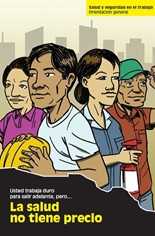Return Home from Work Safely and with Dignity: A family of materials for Spanish-speaking immigrant workers
September 15, 2015
NIOSH Update:
Contact: Nura Sadeghpour (202) 245-0673

In anticipation of Hispanic Heritage Month, the National Institute for Occupational Safety and Health (NIOSH) has released a series of illustrated communication products for organizations that serve Spanish-speaking immigrant workers. The family of products, entitled Protéjase en el trabajo (Protect yourself at work), encourages immigrant workers to seek help if they have a question about their workplace safety or health.
NIOSH partnered with the Mexican Ministry of Foreign Affairs and their network of 50 consulates in the U.S. to create support for the Protéjase project and help workers act on the occupational safety and health information they receive through the materials. The multi-faceted project includes four brochures, five short videos, and two posters encouraging immigrant workers to know and exercise their rights to workplace safety and health.
“The partnership with the Mexican Ministry of Foreign Affairs and the creation of the Protéjase materials are part of NIOSH’s mission to promote health equity and deliver occupational safety and health information to all segments of the U.S. workforce,” said NIOSH Director John Howard, M.D. “The ongoing collaboration between NIOSH and the Mexican government aims to promote this information while simultaneously developing NIOSH’s internal capacity to better document and reduce occupational health disparities for Mexican immigrants in the U.S.”
Because Spanish-speaking immigrant workers may be unfamiliar with U.S. labor, health, legal or other systems, community-based organizations that have existing relationships with these workers are often a comfortable, trusted and empowering entry point for their questions and concerns. The Protéjase materials raise awareness of who can help and encourage workers with simple messages:
- know your rights
- know the hazards on the job
- know what you can do
- seek help if you have a concern
The infrastructure of the Mexican consular system in the U.S., as one of these trusted venues, offers workers not only necessary information but also the health, social, community, and legal services they may need to advocate for themselves, improve their workplace safety and health, and overcome the many barriers they may face.
Although the consulates are an established infrastructure serving to connect immigrant workers with their local resources, the Protéjase materials can be distributed by any organization that serves Latino immigrant communities.
“Increasing awareness of workplace hazards, exposures, and basic protection is a first step to improving immigrants’ abilities to be safe and healthy on the job,” said project lead Michael Flynn, MA, Assistant Coordinator of NIOSH’s Priority Populations and Health Disparities Program. “We seek to develop ways in which to integrate occupational safety and health into existing activities and infrastructure.”
Inside Protéjase
NIOSH Protéjase materials, all in Spanish, include print materials that portray issues faced by a family of workers. The materials provide a basic orientation to occupational safety and health, illustrate common types of hazards, and offer suggestions for how to address safety concerns at work. They include specific safety recommendations for hotel and construction workers.
Protéjase video testimonials feature personal stories of how workplace injuries have affected a worker’s life, and advice for others. One of these stories deals with sexual harassment on the job; others deal with on-the-job injuries in residential roofing construction, warehouses, meat-processing plants, and fast-food restaurants.
All of these communication products were developed through a process involving community outreach, engagement, and input grounded in the principles of qualitative research and analysis.
To find out more about the Protéjase materials, additional resources available for Spanish-speaking immigrant workers, and to download the materials free of charge, please visit the Protéjase website in English or Spanish.
To take a look at the first few in a series of NIOSH science blogs that describe the content and usefulness of the Protéjase materials, the development and testing of illustrations and text, and the role of the NIOSH/Mexican Ministry of Foreign Affairs partnership please visit: http://blogs.cdc.gov/niosh-science-blog/category/occupational-health-equity/
NIOSH is the federal agency that conducts research and makes recommendations for preventing work-related injuries, illnesses, and deaths. For more information about NIOSH visit: http://www.cdc.gov/niosh/.
 Tweet this: Take a look at NIOSH print materials that show Spanish-speaking workers how to get help: http://go.usa.gov/362mC
Tweet this: Take a look at NIOSH print materials that show Spanish-speaking workers how to get help: http://go.usa.gov/362mC
 Post this: NIOSH releases the “Protect yourself at work” series of print materials and videos for Spanish speaking immigrant workers that provide an overview of occupational safety and health concepts, basic worker rights, and suggestions for taking action: http://go.usa.gov/362mC
Post this: NIOSH releases the “Protect yourself at work” series of print materials and videos for Spanish speaking immigrant workers that provide an overview of occupational safety and health concepts, basic worker rights, and suggestions for taking action: http://go.usa.gov/362mC
- Page last reviewed: September 15, 2015
- Page last updated: September 15, 2015
- Content source:
- National Institute for Occupational Safety and Health Education and Information Division


 ShareCompartir
ShareCompartir